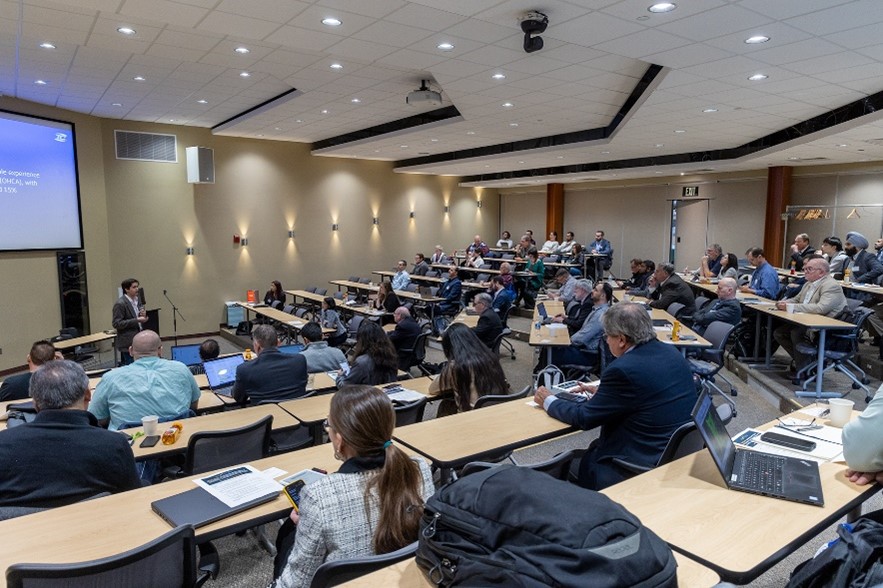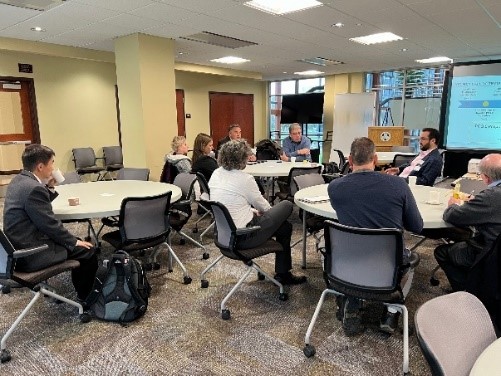
NextFlex Convenes the Hybrid Electronics Community at Binghamton University
Binghamton University hosted the NextFlex hybrid electronics community on April 18 for a day of expert presentations, breakout sessions on technology and manufacturing topics, and networking. Seventy-five attendees from industry, academia, and government convened to provide presentations in two technical sessions. The first focused on the enabling manufacturing and technology for additive and printed packaging and electronics integration. The second session described several applications driving the need for novel advanced packaging capabilities. Dr. Scott Miller welcomed attendees with a high-level overview of NextFlex and a brief update on the newly released manufacturing technology roadmaps. Mark Poliks, SUNY Distinguished Professor of Engineering at Binghamton University, then welcomed workshop attendees to the university and introduced the opening keynote speaker, Sufi Zafar, Principal Research Staff Member, IBM TJ Watson Research Center, who emphasized the importance of technology development, specifically for advancing biosensor systems to improve human health and agriculture monitoring.
The Manufacturing and Technology session featured a keynote from Dr. Chris Striemer, Director of TAP Operations, AIM Photonics, who shared an overview of the AIM Photonics Test, Assembly and Packaging facility which is a full-flow packaging facility with a 300mm bumping line, chip-level assembly, and metrology and test capability. His talk concluded with announcements about capability expansion in both the 300mm wafer line and at the chip level, as well. Other notable talks were presented by Dr. Dan Hines, Co-Director, Raytheon-UMass Lowell Research Institute, Rafael Tudela, Technical Program Leader for Flexible and Printed Electronics, Tapecon, and Dr. Jeff Morse, Director, Advanced Print and Roll-to-Roll Manufacturing Facility, UMass Amherst.
 The afternoon session on key application drivers was led by a keynote presentation by Dr. Abe Stroock, Professor, Chemical and Biomolecular Engineering and Adjunct Professor for the School of Integrative Plant Sciences at Cornell University, who spoke about how electronics can impact improvements in agriculture and specifically about how to improve water use and creating the “Internet of living things.” Following the keynote, talks were presented by Jesse Jur, Director of Ecosystem Technology, AFFOA, Dr. Per Stromhaug, Associate VP, Innovation and Economic Development, Binghamton University, Haley Katz, Technical Lead, PEEMS Center, DEVCOM AC, Dr. Pratap Rao, Associate Professor, Department of Mechanical and Materials Engineering, WPI, and Dr. Jonathan Short, Technology Manager, Electronic Systems & Radiation Detection, GE Healthcare.
The afternoon session on key application drivers was led by a keynote presentation by Dr. Abe Stroock, Professor, Chemical and Biomolecular Engineering and Adjunct Professor for the School of Integrative Plant Sciences at Cornell University, who spoke about how electronics can impact improvements in agriculture and specifically about how to improve water use and creating the “Internet of living things.” Following the keynote, talks were presented by Jesse Jur, Director of Ecosystem Technology, AFFOA, Dr. Per Stromhaug, Associate VP, Innovation and Economic Development, Binghamton University, Haley Katz, Technical Lead, PEEMS Center, DEVCOM AC, Dr. Pratap Rao, Associate Professor, Department of Mechanical and Materials Engineering, WPI, and Dr. Jonathan Short, Technology Manager, Electronic Systems & Radiation Detection, GE Healthcare.
Following the presentations, workshop attendees moved into two parallel breakout discussions tasked to identify technical gaps, prioritize needs, define potential impacts, and develop topic ideas for the next NextFlex-funded Project Call, tentatively scheduled to be released in early June.
Workshop presentations have been posted to the NextFlex Member Portal.
